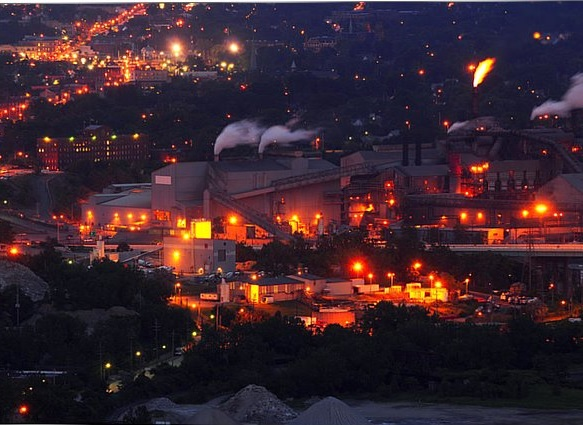Life & Island Times: Road Valley of Steel
Editor’s Note: Marlow has been on a tear of late. I was an early fan of his “Four Corners” saga of a counter-clockwise motorcycle trip around the perimeter of the Lower 48 states. Today, he touches here on some home country, and a reminder of an impending crisis in which my brother and I may have to give away the classic 1959 Rambler Cross Country Station Wagon. Museum is closing out from under us. I can’t get back out there. Jeeze….after that magnificent drive from Pensacola to Culpeper and then west to Kokomo, IN…I will keep you posted on how that goes. But there are a lot of little towns that are more bedraggled than that between here and there.
It is what some of us call “home.”
– Vic
Road Valley of Steel
First it was the iron belt, then the steel belt and finally the rust belt. It was a wide ribbon stretching across almost a thousand miles of small town after small town of mills, open hearth furnaces, stamping plants, manufacturers of planes, trains, automobiles, appliances and anything and everything else the world needed. At least it was until it wasn’t.
When I first rode on two wheels through this particular town in 1960s, the region was still the steel belt. The main plant in this small valley was massive, grime-streaked, and squat with multiple stacks, each one trailing a black ribbon across the sky. Fires could be seen flickering through its windows and long flames now and then appeared to weave and dance from the tops of guy wired metal flues.
Other smaller enterprises had buildings with steam rising in clouds from unseen vents and short chimneys atop their roofs. The sound was overwhelming — hissing, clanging, banging, rumbling, shrieking. It muted everything and everyone around it.
Narrow residential streets climbed the valley’s steep sided ravines. They were packed with small, tidy one and two story white clapboarded homes that were soot covered grey in appearance.
Each day these places spewed forth their residents who would plunge directly down the hillside, straight towards the mill and other plants. The evenings saw a reverse flow of humanity.
These sad, grim-looking streets and homes hung onto the valley’s sides by the skin of their teeth. Twenty years later when I rode through them once again, the residents were facing the same fate — hanging on by the skin of their teeth.
Now I was headed eastward through this discarded Arsenal of America way station, I saw dilapidated, boarded up stores hugging the narrow empty sidewalks that forty years earlier were alive with kids and shoppers. Battered store signs hung askew and squeaked in the wind.
Sandwiched between the now empty stores and scattered on twisting roads atop and up the hillsides were abandoned, rotting homes and empty home sites whose former houses had seemed twenty years before to be on the verge of toppling over, and undoubtedly did, except for those who occupants remained somehow connected to one another by a mad will to cling to this place.
The noise of work and production had been replaced by a silent dissonance, more frightening than the clamor of the past. Sooner or later, I thought as I rode through this town, it would decay and finally falter, slipping down the grade and slide out of sight like so many other mill towns had in the rust belt.

A Postcard From a Valley of Steel
Who will be graveside when these places die and are interred? Who will say the last and truthful rites for these faithful towns, press the crucifix to their dry lips, and anoint their foreheads with oil . . . through this holy oil, may they join the Lord in his love and rise up in the promised second coming . . . they were full of life, faith, and hope but still died and could not be resurrected. They brought many people and much goodness into the world, but carry nothing out upon their passing. They gaveth, the world taketh, and they got this in return. Blessed be the names of these Valley of Steel towns . . .
Copyright © 2018 From My Isle Seat
www.vicsocotra.com
